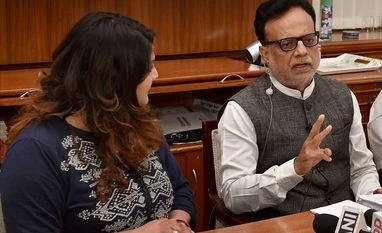The GST would not increase compliance burden on assessees and all apprehensions in this regard are misplaced, Revenue Secretary Hasmukh Adhia said today.
"Many people think that implementation of GST would result in an increase in compliance cost. This is completely misplaced," he said while addressing netizens on Facebook.
Explaining the rationale, he said people have to keep different law books for filing return for various taxes like VAT, Excise etc in the present taxation regime.
Adhia, who is spearheading implementation of the Goods and Services Tax (GST), said the finance ministry is gearing up for its roll out and five days training has already been given to officers.
Besides, IT training for them is going on, he said.
The government intends to implement the GST from July 1 and the GST Council headed by Finance Minister Arun Jaitley has finalised four rate categories of 5 per cent, 12 per cent, 18 per cent and 28 per cent after unifying levies like central excise, service tax and VAT.
Fitment will be done by adding the total incidence of current taxation (central plus state levies) and then putting the good or service in the tax bracket closest to it.
Adhia also said indirect tax burden may come down in the new GST regime.
"There would be many goods and services which would be out of GST so it would provide benefit to common man in respect of taxes. The roll out GST would be either tax neutral or there could be a reduction of the tax burden," he said.
With regard to traders, he said, the tax filing would start from the threshold level of Rs 20 lakh and registration below the threshold limit is not required.
Within one state under one PAN only one registration is allowed, he said.
No other registration is allowed for one business but there is a requirement of separate registration in case of supply of products in more than one state, he added.
For a coding purpose, he said, no Harmonized System of Nomenclature (HSN) code is required for business turnover of Rs 1.5 crore.
On petroleum and alcohol products coming under GST, the revenue secretary said that these may not be under the new tax regime till such time the GST Council decides to impose a rate.
"In future, if states decide then alcohol, petrol, natural gas will come under GST," he said.
"Many people think that implementation of GST would result in an increase in compliance cost. This is completely misplaced," he said while addressing netizens on Facebook.
Explaining the rationale, he said people have to keep different law books for filing return for various taxes like VAT, Excise etc in the present taxation regime.
More From This Section
"But with the roll-out of GST, there would be a single tax and accounting for this will be very simple. It can be done through an offline excel form provided by GST Network. If someone uses this form for keeping the record of purchase and sales, then he can use this for filing return. Thus, compliance would be minimised," he said.
Adhia, who is spearheading implementation of the Goods and Services Tax (GST), said the finance ministry is gearing up for its roll out and five days training has already been given to officers.
Besides, IT training for them is going on, he said.
The government intends to implement the GST from July 1 and the GST Council headed by Finance Minister Arun Jaitley has finalised four rate categories of 5 per cent, 12 per cent, 18 per cent and 28 per cent after unifying levies like central excise, service tax and VAT.
Fitment will be done by adding the total incidence of current taxation (central plus state levies) and then putting the good or service in the tax bracket closest to it.
Adhia also said indirect tax burden may come down in the new GST regime.
"There would be many goods and services which would be out of GST so it would provide benefit to common man in respect of taxes. The roll out GST would be either tax neutral or there could be a reduction of the tax burden," he said.
With regard to traders, he said, the tax filing would start from the threshold level of Rs 20 lakh and registration below the threshold limit is not required.
Within one state under one PAN only one registration is allowed, he said.
No other registration is allowed for one business but there is a requirement of separate registration in case of supply of products in more than one state, he added.
For a coding purpose, he said, no Harmonized System of Nomenclature (HSN) code is required for business turnover of Rs 1.5 crore.
On petroleum and alcohol products coming under GST, the revenue secretary said that these may not be under the new tax regime till such time the GST Council decides to impose a rate.
"In future, if states decide then alcohol, petrol, natural gas will come under GST," he said.
)